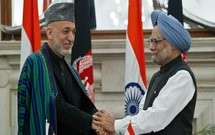 After over a decade of conflict, the US-led International Security Assistance Force (ISAF) is still engaged in a war on terror in Afghanistan. While the preparations for the final withdrawal by 2014 are proceeding apace, there are indications that the US would maintain some forces in Afghanistan even after the final withdrawal.
After over a decade of conflict, the US-led International Security Assistance Force (ISAF) is still engaged in a war on terror in Afghanistan. While the preparations for the final withdrawal by 2014 are proceeding apace, there are indications that the US would maintain some forces in Afghanistan even after the final withdrawal.
Although no figure has yet been fixed, there is talk of three possible options – low, medium or high levels of troops (ranging from 3,000 to 15,000 including even a zero troop option as per one report) to be retained. However, there are no clear indications about the governmental set-up in Kabul post-2014.
Pakistan has always nurtured a pliant regime in Afghanistan so as to use it as ‘strategic depth’ against India. It has been consistently following its time-tested duality of policy of selectively supporting the US / NATO ‘War on Terror’ (to get massive financial and arms aid) while also supporting/ sheltering terrorist groups so as to be used for its own purpose whenever required. While the US is now cognizant of Pakistani duplicity, its dependence on Pakistan for logistic support to its conflict in Afghanistan will force it to play along with Pakistan. After unsuccessful attempts by the US to negotiate directly with Taliban, it appears, the US and UK have now encouraged a dialogue between Afghanistan, Taliban and Pakistan to negotiate a peaceful arrangement for Kabul post-2014. This means playing in to the hands of Pakistan with the eventual possibility of Pakistan installing the Taliban and/ or other terrorist groups in Kabul.
Likely Situation Post-2014
The entire Af-Pak region is presently in turmoil. If all goes well, some sort of a government (either Karzai-led as at present or a coalition with various Afghan groups) would be in power in Kabul. With the promised international financial, security and developmental assistance, Afghanistan could continue its rebuilding to occupy an honourable place in the comity of nations. But with Pakistan’s machinations, Afghanistan may well revert to the dark days of pre-2001 to be ruled by Taliban or a conglomeration of terrorist outfits. Pakistan has been using various terrorist groups for its own ends. Some of these groups like the Tehrik-e-Taliban Pakistan (TTP) have been carrying out suicide attacks on Pakistani security posts and personnel. It is not going to be easy for Pakistan to control these terrorists. With the general election due in May 2013 and the recent rise of Canadian passport-holder religious leader Qadri, political atmosphere has already started heating up in Pakistan. India has to be prepared for the worst as Pakistan has a history of resorting to anti-India rhetoric as well as increase terrorist infiltration into India to divert attention from its internal turmoil.
India’s role
Historically, Indo-Afghan relations have been very close. However, since 2001, India has restricted its role to non-military aid. India’s contribution in reconstruction and development of Afghanistan has been wide and meaningful resulting in tremendous goodwill for India among the Afghanistan population. But India should keep all options open depending upon how the post-2014 situation develops.
The biggest disadvantage that India faces in Afghanistan is limited surface access to it. The closest and most economical route is through Pakistan which obviously is a non-starter. India, Iran and Afghanistan have already set up a joint working group to finalise the development and use of Chabahar Port in Iran. Similarly, both India and Russia are keen to have alternative access to Afghanistan via the Central Asian Republics (CAR) – the North-South Corridor which is being used by the ISAF as an alternative route for their supplies. Access through Iran and the CAR should be expedited proactively by India by even voluntarily taking on any infrastructure development (like building Chabahar port facility) and funding, if required.
Security of Indian personnel is another major problem faced by India which would become more serious post-2014. In fact, lack of security has resulted in reduction in number of Indian personnel and slow progress of Indian projects since 2009. Notwithstanding any resistance from Pakistan, India should be prepared to induct security personnel, if needed, for foolproof security of its own projects and personnel.
India should continue to help Afghanistan in its rebuilding and development. Besides building infrastructure, it could also help in building democratic governance institutions. An Indian consortium has already secured the ‘Hajigak mines’ exploration. The positive response received from Indian entrepreneurs during the Delhi Investment Summit on Afghanistan in June 2012 should be taken to its logical conclusion. India should continue its socio-economic development projects with vigour. The fact that cricket and Bollywood are popular among the Afghans could be exploited.
India has been training Afghan security forces for over five decades. During his recent visit to India, President Karzai requested that training of its security forces be stepped up. Presently, the training is primarily limited to training of Afghan security personnel on various courses conducted by India’s security training institutes. Additional vacancies could be allotted to speed up training. The possibility of sending a security training team to train Afghan security personnel in Afghanistan now needs serious consideration to enable larger number of personnel to be trained well before the deadline of December 2014.
The author is a defence analyst based in Deolali (Nashik). Views expressed are personal.
By Special Arrangement with The Centre For Land Warfare Studies (CLAWS) (http://www.claws.in)